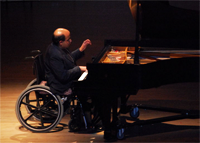音楽....治療するための、あるいは能力を奪うための:「誰のための療法か」
DOI:
https://doi.org/10.15845/voices.v14i3.793キーワード:
disability, selfhood, music therapy, Disability Studies in Music, reflexivity, accessibility, performance要旨
この記事は「音楽療法における障がい学の役割は何か」について、さらに「障がい学における音楽療法の役割は何か」について問いを投げかける。音楽における障がい学と、音楽療法の遭遇が意味するものについて、それぞれの領域がお互いに関わる中で果たす補完的な、しかしおそらくは葛藤的な役割について述べる。私自身の背景や研究の関心のため、前者の問い、すなわち障がい学が音楽療法の理論や実践に対してどのような寄与をするかについて、重点的に述べることになろう。
Downloads
出版済
2014-10-20
How to Cite
Honisch, S. (2014). 音楽.治療するための、あるいは能力を奪うための:「誰のための療法か」. Voices: A World Forum for Music Therapy, 14(3). https://doi.org/10.15845/voices.v14i3.793
巻号
セクション
Invited Submission - Special Issue
License
Articles published prior to 2019 are subject to the following license, see: https://voices.no/index.php/voices/copyright

